What Leads To Signs Of Oral Cancer And Treatments
Learn about the leading causes and early signs of oral cancer. Discover effective treatment options and how to protect your oral health.

Written by Dr. M L Ezhilarasan
Reviewed by Dr. Dhankecha Mayank Dineshbhai MBBS
Last updated on 13th Jan, 2026
.webp?tr=q-80,f-webp,w-350,dpr-2,c-at_max 700w)
Introduction
Oral cancer, a term encompassing cancers of the mouth and throat, is a significant health concern worldwide. While the diagnosis can be daunting, early detection dramatically improves outcomes and opens up a wider range of effective treatment options. This article serves as a comprehensive guide for anyone seeking to understand this disease. We will explore the subtle and not-so-subtle warning signs you should never ignore, delve into the primary causes and risk factors—from lifestyle choices to viral infections—and break down the modern, multi-faceted approaches to treatment. Whether you're looking to assess your own risk, support a loved one, or simply become more informed, knowledge is your most powerful tool in the fight against oral cancer. Let's navigate the journey from first symptoms through to recovery and beyond.
Understanding Oral Cancer: A Brief Overview
Oral cancer refers to the uncontrolled growth of cells that invade and cause damage to surrounding tissues in the oral cavity. This includes the lips, tongue, cheeks, floor of the mouth, hard and soft palate, sinuses, and pharynx (throat). The most common type is squamous cell carcinoma, which accounts for over 90% of all cases, originating in the thin, flat cells that line the mouth and throat. Each year, thousands of new cases are diagnosed, but the survival rate is high when the disease is caught in its early, localized stages. Understanding its nature is the first step toward effective prevention and timely action.
Recognizing the Early Signs and Symptoms
Early detection is the cornerstone of successful oral cancer treatment. Many early signs are subtle and easy to dismiss, which is why regular self-exams and dental check-ups are crucial.
Common Visual and Physical Symptoms
- Patches in the Mouth: Look for white patches (leukoplakia), red patches (erythroplakia), or a mixed red-and-white patch (erythroleukoplakia). Erythroplakia is particularly concerning as it has a higher potential to be cancerous.
- Sores that Don't Heal: A persistent sore on the lip or inside the mouth that bleeds easily and does not heal within two weeks is a major red flag.
- Lumps or Thickening: Any lump, rough spot, crust, or area of thickened tissue in the oral cavity, on the lip, or in the neck should be evaluated.
- Unexplained Bleeding: Bleeding in the mouth without an obvious cause.
Symptoms You Might Feel But Not See
- Persistent Pain: Ongoing pain, tenderness, or numbness anywhere in the mouth, on the lip, or in the ear.
- Difficulty Chewing or Swallowing: A feeling that something is caught in the back of the throat, or pain when swallowing (odynophagia).
- Chronic Sore Throat: A sore throat that doesn't go away, hoarseness, or a change in your voice.
- Loose Teeth: Teeth becoming loose for no apparent dental reason, or dentures that suddenly no longer fit well.
Red Flag Signs: When to See a Doctor Immediately
If any of the above symptoms of mouth cancer persist for more than two weeks, it is imperative to seek professional medical evaluation. If symptoms persist beyond two weeks, consult a doctor online with Apollo24|7 for further evaluation. Do not wait for your next dental appointment; early intervention is critical.
Consult Top Specialists
What Leads to Oral Cancer? Key Causes and Risk Factors
While the exact cause of the cellular DNA mutation that triggers oral cancer is not always clear, several strong risk factors have been identified.
Lifestyle Factors: Tobacco and Alcohol
Tobacco use in any form—cigarettes, cigars, pipes, chewing tobacco, and snuff—is the single largest risk factor. The chemicals in tobacco are carcinogenic. Similarly, heavy alcohol use significantly increases risk. The combination of tobacco and alcohol creates a synergistic effect, multiplying the risk far more than either alone.
The HPV Connection
Infection with the human papillomavirus (HPV), particularly HPV16, is a rapidly growing cause of oropharyngeal cancers, especially those involving the tonsils and the base of the tongue. This is a distinct type of throat cancer often seen in younger, non-smoking individuals.
Other Significant Risk Factors
- Prolonged Sun Exposure: Linked to cancers of the lip.
- Diet: A diet low in fruits and vegetables may increase risk.
- Age and Gender: Risk increases with age, and men are more than twice as likely to develop it.
- Weakened Immune System: Individuals with compromised immune systems are at higher risk.
How is Oral Cancer Diagnosed?
The Initial Screening and Physical Exam
The process often begins with a visual and tactile screening. A doctor or dentist will look for any abnormalities—sores, white patches, red patches, or lumps. They will feel the tissues in your mouth and palpate your neck for any swollen lymph nodes.
Diagnostic Tests: Biopsies and Imaging
If a suspicious area is found, a biopsy is the only definitive way to diagnose oral cancer. A small sample of tissue is removed and sent to a pathology lab for analysis. If cancer is confirmed, imaging tests like CT scans, MRIs, or PET scans are used to determine the extent (stage) of the disease and see if it has spread.
Staging Oral Cancer: Determining the Extent
Staging is a crucial process that describes the severity of the cancer based on the size of the tumor (T), whether it has spread to lymph nodes (N), and the presence of metastasis (M) to other parts of the body. This TNM system, ranging from Stage 0 (carcinoma in situ) to Stage IV (advanced metastatic cancer), guides the treatment plan and provides prognostic information.
Comprehensive Oral Cancer Treatment Modalities
Treatment for oral cancer is highly personalized and often involves a team of specialists (surgeons, medical oncologists, radiation oncologists). The plan depends on the cancer's location, stage, and the patient's overall health.
Surgical Interventions for Removal
Surgery aims to remove the cancerous tumor and a margin of healthy tissue around it. This can range from a minor procedure for early-stage cancers to more extensive operations like a glossectomy (removal of part or all of the tongue) or mandibulectomy (removal of part of the jawbone). Reconstructive surgery is often performed to restore appearance and function.
Radiation Therapy: Targeting Cancer Cells
Radiation uses high-energy beams to kill cancer cells. It's often used after surgery to destroy any remaining cells, but can also be a primary treatment. Modern techniques like IMRT precisely target the tumor, sparing surrounding healthy tissue.
Chemotherapy and Targeted Drug Therapy
Chemotherapy uses powerful drugs to kill cancer cells throughout the body and is often combined with radiation (chemoradiation) for advanced cancers. Targeted therapy drugs, like Cetuximab, work by targeting specific aspects of cancer cells that help them grow, offering a different approach with different side effects of treatment.
Immunotherapy: A New Frontier
Immunotherapy is a breakthrough treatment that boosts the body's own immune system to fight cancer. Drugs called checkpoint inhibitors have shown significant success in treating recurrent or metastatic oral cancer that hasn't responded to other treatments.
Life After Treatment: Recovery and Rehabilitation
The journey doesn't end when active treatment does. Recovery focuses on healing and regaining a good quality of life.
Managing Side Effects and Nutrition
Treatments can cause dry mouth, difficulty swallowing, loss of taste, and dental problems. Working with a nutritionist is vital to maintain a healthy weight and intake. Apollo24|7 offers convenient home collection for tests like those monitoring nutrition levels during recovery.
Speech and Swallowing Therapy
Many patients require rehabilitation with a speech-language pathologist to relearn how to speak and swallow effectively after surgery or radiation.
The Importance of Follow-Up Care
Regular follow-up appointments for years after treatment are essential to monitor for recurrence, manage long-term side effects, and provide psychosocial support.
Prevention: Reducing Your Risk of Oral Cancer
Not all cases are preventable, but you can drastically reduce your risk:
- Avoid all tobacco products.
- Limit alcohol consumption.
- Get vaccinated against HPV.
- Protect your lips from the sun with a broad-spectrum sunscreen.
- Maintain a healthy diet rich in fruits and vegetables.
- See your dentist regularly for check-ups, which include an oral cancer screening.
Quick Takeaways: Key Points to Remember
- Early Detection is Key: Know the signs and perform monthly self-exams.
- See a Professional: Any mouth sore or lump that doesn't heal in two weeks warrants a doctor's visit.
- Major Risks: Tobacco, heavy alcohol use, and HPV are the primary risk factors.
- Treatment is Multimodal: It often involves a combination of surgery, radiation, and chemotherapy.
- Rehabilitation is Crucial: Recovery includes physical, nutritional, and emotional support.
- Prevention Works: Quitting tobacco, limiting alcohol, and getting the HPV vaccine are powerful preventive steps.
Conclusion
Facing the possibility of oral cancer can be overwhelming, but arming yourself with knowledge transforms fear into empowerment. Understanding the early warning signs—those persistent sores, patches, and lumps—gives you the power to act swiftly. Recognizing the leading causes, from lifestyle choices to viral infections, provides a roadmap for prevention. And finally, modern medicine offers a robust and continually improving arsenal of treatments, from precision surgery and radiation to cutting-edge immunotherapy, all supported by essential rehabilitation services. Your oral health is a window to your overall well-being. Stay vigilant, prioritize regular check-ups, and never hesitate to seek professional advice for any concerning changes. Your proactive approach is your strongest defense.
Consult Top Specialists
Consult Top Specialists

Dr Devashish Tripathi
Radiation Specialist Oncologist
20 Years • MBBS, PLAB, MRCP (UK)- General Medicine, FRCR (Oncology), Certificate of Completion of Training (CCT)- Clinical Oncology
Delhi
Apollo Hospitals Indraprastha, Delhi

Dr. Sanchayan Mandal
Medical Oncologist
17 Years • MBBS, DrNB( MEDICAL ONCOLOGY), DNB (RADIOTHERAPY),ECMO. PDCR. ASCO
Kolkata
MCR SUPER SPECIALITY POLY CLINIC & PATHOLOGY, Kolkata

Dr. Sandeep Muzumder
Radiation Specialist Oncologist
21 Years • MBBS (JIPMER, Pondicherry), MD (AIIMS, New Delhi)
Bhubaneswar
Apollo Hospitals Old Sainik School Road, Bhubaneswar
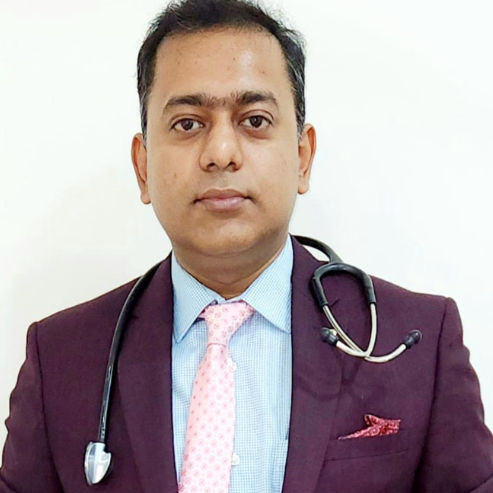
Dr.sanchayan Mandal
Medical Oncologist
17 Years • MBBS, DrNB( MEDICAL ONCOLOGY), DNB (RADIOTHERAPY),ECMO. PDCR. ASCO
Kolkata
Dr. Sanchayan Mandal Oncology Clinic, Kolkata

Dr. Anindita Ray
Oncologist
7 Years • MBBS, MD ( Radiation Oncology )
Kolkata
MCR SUPER SPECIALITY POLY CLINIC & PATHOLOGY, Kolkata
Consult Top Specialists

Dr Devashish Tripathi
Radiation Specialist Oncologist
20 Years • MBBS, PLAB, MRCP (UK)- General Medicine, FRCR (Oncology), Certificate of Completion of Training (CCT)- Clinical Oncology
Delhi
Apollo Hospitals Indraprastha, Delhi

Dr. Sanchayan Mandal
Medical Oncologist
17 Years • MBBS, DrNB( MEDICAL ONCOLOGY), DNB (RADIOTHERAPY),ECMO. PDCR. ASCO
Kolkata
MCR SUPER SPECIALITY POLY CLINIC & PATHOLOGY, Kolkata

Dr. Sandeep Muzumder
Radiation Specialist Oncologist
21 Years • MBBS (JIPMER, Pondicherry), MD (AIIMS, New Delhi)
Bhubaneswar
Apollo Hospitals Old Sainik School Road, Bhubaneswar

Dr.sanchayan Mandal
Medical Oncologist
17 Years • MBBS, DrNB( MEDICAL ONCOLOGY), DNB (RADIOTHERAPY),ECMO. PDCR. ASCO
Kolkata
Dr. Sanchayan Mandal Oncology Clinic, Kolkata

Dr. Anindita Ray
Oncologist
7 Years • MBBS, MD ( Radiation Oncology )
Kolkata
MCR SUPER SPECIALITY POLY CLINIC & PATHOLOGY, Kolkata
More articles from Oral Cancer
Frequently Asked Questions
Is oral cancer curable?
Yes, especially when detected early. The 5-year survival rate for localized oral cancer is very high. Even advanced cases have treatment options that can control the disease and provide a good quality of life.
How can I check for oral cancer at home?
In a well-lit area, look and feel inside your lips and front of gums. Tilt your head back to check the roof of your mouth. Pull your cheeks out to see the inside surfaces and back of gums. Examine your tongue, its top, bottom, and sides. Feel for lumps or enlarged lymph nodes on both sides of your neck.
Does getting a white patch in the mouth mean I have cancer?
Not necessarily. A white patch (leukoplakia) can be benign, often caused by irritation. However, some leukoplakia can show pre-cancerous changes. Any persistent white or red patch must be evaluated by a dentist or doctor to rule out early symptoms of mouth cancer.
What is the survival rate for HPV-positive oral cancer?
Generally, HPV-positive oropharyngeal cancers have a better response to treatment and a higher survival rate compared to HPV-negative cancers caused by smoking and alcohol.
How long does treatment for advanced oral cancer take?
A full course of treatment, which may include a combination of surgery, radiation, and chemotherapy, can span several months. This is followed by a lengthy recovery and rehabilitation period to manage side effects and restore function.
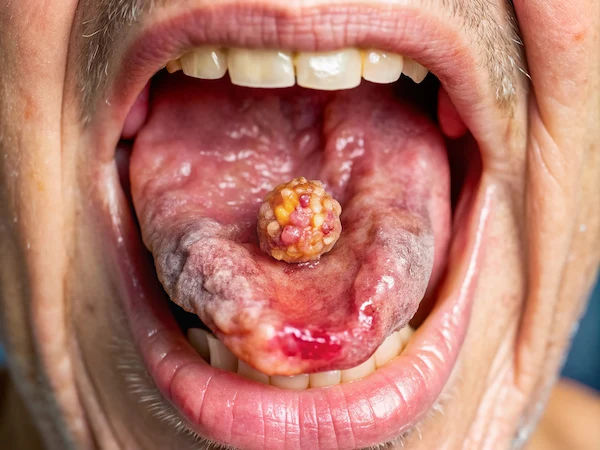
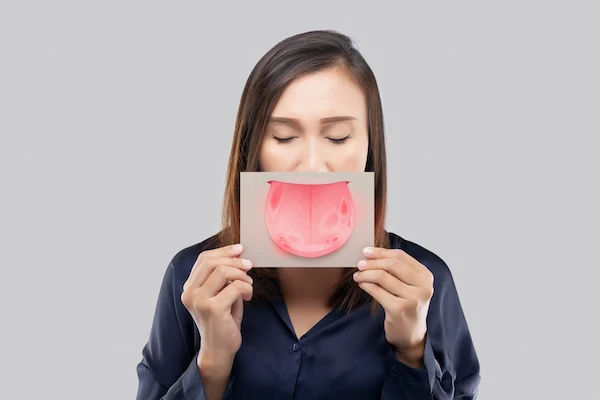
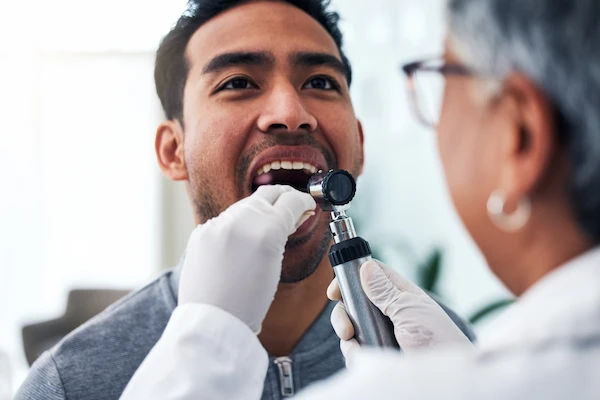
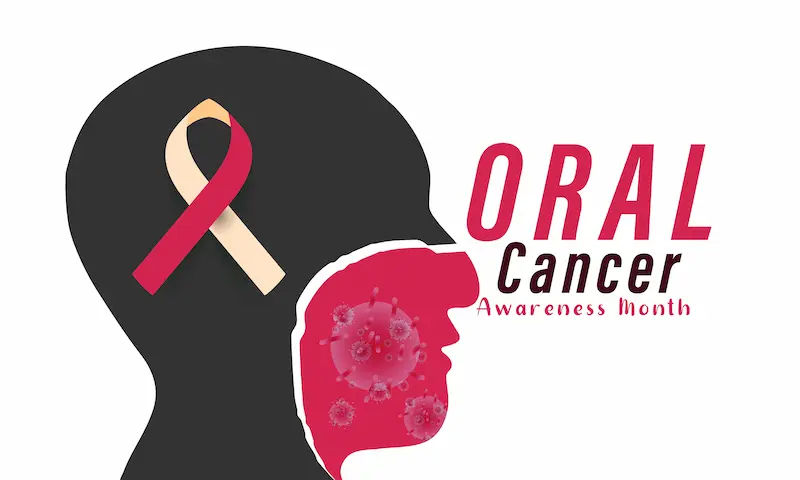
_0.webp)